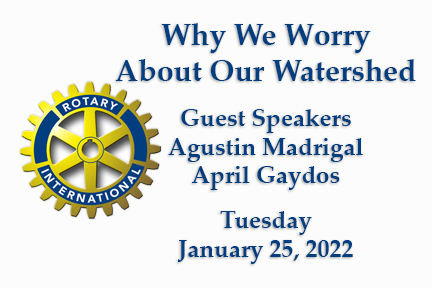Why We Worry About Our Watershed [] Rotary Club Program
Event Category: All Events, Community Events, Learning/Education, and Presentations/Discussions
-
Rotary is now holding “hybrid” meetings
where you may choose between in-person participation
at the Hotel Real de Minas or ZOOMJoin This Week’s ZOOM Meeting
Sign up at www.rotarysmamidday.org
or email secretaryrotarysma@mail.com
and you’ll receive an email with instructions
for joining this week’s meeting.Please support our Rotary Projects

By: April Gaydos and Elizabeth Adlung
Ask anyone where they live and they’ll usually tell you the name of their city, state, country, or their neighborhood, but they won’t mention their watershed, although it could be the most meaningful boundary to describe their home.
How so?
Whether you know the term or not, everyone lives in a watershed–a unique location on the planet defined by the mountains that usher rainfall from the highest peaks to the lowest valleys. A watershed creates the conditions that make life possible, sources of water–aquifers, rivers, streams and wetlands for humans and wildlife. It creates fertile soils, nurtures trees and plants that clean our air, provides the food we eat, the water we drink, the plants for fuel, building materials and, for many, their livelihoods.
The health of a watershed and how well it supports life depends, to a large degree, upon how the ecology is altered by human activities.
Our watershed
Our watershed, the Upper Rio Laja (Cuenca de Alto Rio Laja), is bounded by mountain chains that surround a large plateau. The Rio Laja, which flows from the Sierra de Guanajuato and through the historic cities of Dolores Hidalgo and San Miguel, is our primary river. It receives most of the rainfall not absorbed by the land and is the primary source of water held in the Presa Allende. The Allende dam marks the end of our watershed. Below the dam, the Rio Laja continues to transport the water to the Rio Lerma and on to Lake Chapala in the state of Jaliscco.
At 1,250,00 acres, the Upper Rio Laja is Guanajuato’s largest watershed with an aquifer of equal size. Nevertheless, the region is one of the poorest, with per capita rate of migration to the United States one of the highest in Mexico, to some extent due to a deteriorated environment. Recently, rapid urbanization contributes to the decline of our watershed.
To support life in our watershed, we must make every raindrop count by rehabilitating our land and improving our land management.
The Midday Rotary Club welcomes Agustin Madrigal, director of Salvemos al Rio Laja, AC who has worked on restoration and conservation in our watershed for nearly 30 years, and April Gaydos, President of Audubon de Mexico, AC, former director of the Urban Watershed Institute in Portland, Oregon. Agustin and April will describe our watershed and the conditions they are working to restore and conserve.
Their projects are important not only for the backbreaking and effective work accomplished with minimal funding by thousands of rural and urban people. Their role in educating and motivating men, women and children, cannot be overstated–they believe it is the key to watershed health.
Join us this Tuesday, January 25 at 9:30 AM to welcome Agustin and April and learn about our watershed. To attend, go to the Midday Rotary Club website at www.rotarysmamidday.org and sign up. You’ll receive an email with instructions on being a part of this week’s meeting.
Rotary is where neighbors, friends and problem-solvers share ideas and create lasting changes. For more information, contact President Skip Essick at skipessickmedia@gmail.com.

Who We Are…
We are a multi-cultural English-speaking Rotary Club located in beautiful and historic San Miguel de Allende, Guanajuato, Mexico, an UNESCO World Heritage Site that has been named by Conde Nast Traveler as the best city in the world!.Our Vision To be a diverse group of active and enthusiastic members who are recognized as providers of valuable services for local and international communities..Our Mission To provide assistance to others in order to improve the quality of life and to advance community understanding, goodwill, and peace.
-
-

